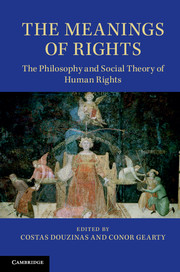Book contents
- Frontmatter
- Contents
- Notes on contributors
- Introduction
- Part I Finding foundations
- Part II Law, rights and revolution
- 5 Philosophy and the right to resistance
- 6 On a radical politics for human rights
- 7 Fanon today
- 8 Race and the value of the human
- Part III Rights, justice, politics
- Part IV Rights and power
- Index
- References
6 - On a radical politics for human rights
Published online by Cambridge University Press: 05 June 2014
- Frontmatter
- Contents
- Notes on contributors
- Introduction
- Part I Finding foundations
- Part II Law, rights and revolution
- 5 Philosophy and the right to resistance
- 6 On a radical politics for human rights
- 7 Fanon today
- 8 Race and the value of the human
- Part III Rights, justice, politics
- Part IV Rights and power
- Index
- References
Summary
There is a perpetual debate in human rights law surrounding the question of whether to create new human rights. On one side many bemoan the incessant generation of rights. They insist that such ‘new’ rights may be adequately accommodated within existing frameworks, and that multiplication of international instruments and obligations merely waters down the ‘core’ set of demands. On the other side are those who insist on the necessity of a supple and fluid usage of the discourse that is responsive to events. The debate around ‘new’ human rights has focused upon making ‘second-generation’ rights like water and sanitation substantive; and generating ‘third-generation’ rights like development, peace or truth. Ultimately this debate represents what Upendra Baxi calls the politics of human rights – i.e. the manner in which they should be deployed in the management of the current distribution of power. He distinguishes this from a politics for human rights, which would name an alternative, ruptural view of the discourse. The debate over new rights – to which I shall return at the end of this chapter – presents itself as a mortal battle. But ultimately neither side challenges the underlying presumptions of rights, and both sides agree on a basic strategy of turning to rights-talk. This chapter seeks to displace the many presumptions of this argument by shifting the grounds of the debate and focusing upon a politics for human rights. That is, the question posed by ‘new rights’ is displaced entirely from one of conserving the established and legitimate discourse, to a strategic question of engagement with and against law.
- Type
- Chapter
- Information
- The Meanings of RightsThe Philosophy and Social Theory of Human Rights, pp. 106 - 120Publisher: Cambridge University PressPrint publication year: 2014
References
- 5
- Cited by



